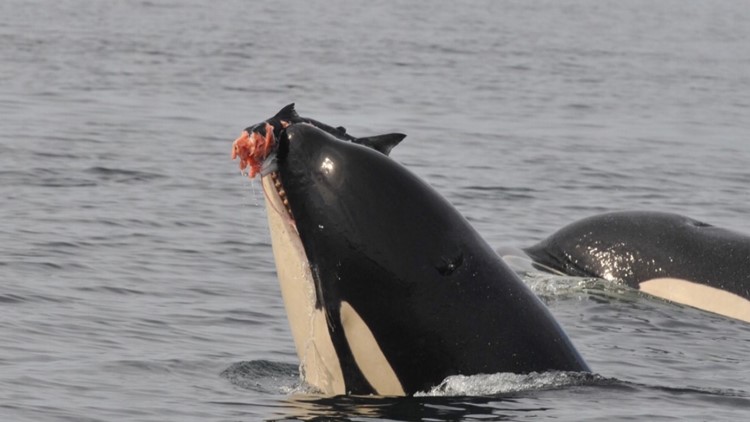Nearly 50 members of Governor Jay Inslee’s orca task force met Tuesday to discuss the emergency situation regarding the ailing Southern Resident killer whales. The group was charged with figuring out how to improve the health and numbers of the three Southern Resident orca pods J, K, and L.
The task force focused on three main topics during their meeting: prey, toxic contaminants in the water, and noise from vessel traffic. Specifically, new legislation to keep boat traffic and drones farther away from the orcas.
A Southern Resident orca mother pushing her dead calf around the Salish Sea has captured international attention. It's the latest in a series of newborn deaths in the past 10 years. At the same time, in the same endangered J-pod, a 4-year-old female is deathly ill.
"The tragic part of it is the mothers and the babies are declining. That's what would provide a future, and we're losing the future,” said Ken Balcomb, head of the Center for Whale Research.
Balcomb has been studying the Southern Resident orcas for the federal government for the past 42 years. He's also one of the members of Inslee's orca task force.
In an email to fellow members of the task force, Senator Kevin Ranker wrote:
"I want to make sure everyone had this excellent legal analysis of a limited entry permit system and a vessel no-go zone that was prepared in 2001 as we consider both of these recommendations again today."
Impassioned members gathered together to talk through these issues, but there is limited time to act in order to help the ailing orca pod.
"We’ve got a body here who is tasked with that responsibility to, by the governor, and he’s told them to put dam breaching on the table. And if they don’t take it seriously, then that may be the end of it,” said Jim Waddell, a former civil engineer with the U.S. Army Corps of Engineers.
Another group focused on contaminants in the water and what role they play in the dwindling numbers. Pollution was a source of frustration among the insiders and many thought that taking tough action on the issue will take too long to save the orcas; however, some think that there is no other option.
“We can no longer do half-measures. We have been kicking the can down the road for many, many years and I hope it’s not too late to save the Southern Resident killer whales. But even if we’re on the edge of it being too late, we still have to act because this is our environment," said Chris Wilke, executive director of Puget SoundKeeper.
"Their population has gone from dozens when we began this study in 1976, to more than 250 now," Balcomb said.
The numbers of transient orcas have risen with the growing number of sea lions in the region, their primary food source.
One of the issues brought up at the meeting was whether the four lower Snake River dams should be taken down for salmon runs to the Columbia River, since salmon is a major food source for the orcas.
Balcomb says lack of food for the Southern Residents is a huge problem that requires thinking bigger than just improved hatcheries and habitat. Balcomb thinks breaching the dams is the only way to provide enough food for Southern Resident whales and possibly save the J-pod from extinction.
The youngest participant at the meeting was 11-year-old London Fletcher who came because she thinks that her generation will ultimately be the one to either save or lose the Southern Resident killer whales.
“Extinction is forever. Once they’re gone, what are we gonna to?" said Fletcher. "Like Ken Malcom says, ‘When they’re gone, we’re going to die of a great loneliness in spirit.’”
Those in charge of the task force said that this is the opportunity that they have waited many years for and hope that changes can be made in time to make a difference.
Les Purce, co-chair of the Southern Resident Killer Whale Force, sees this issue as one that could eventually mirror humans in the future.
“I think that not only the citizens of the state are moved by what they see with the orcas, but I think the real thing that’s touching everyone - I know it’s touching me - is this is really a message about our ecosystem, about us, and about how we will be in this environment long-term and our families beyond us," said Purce.
More coverage:



